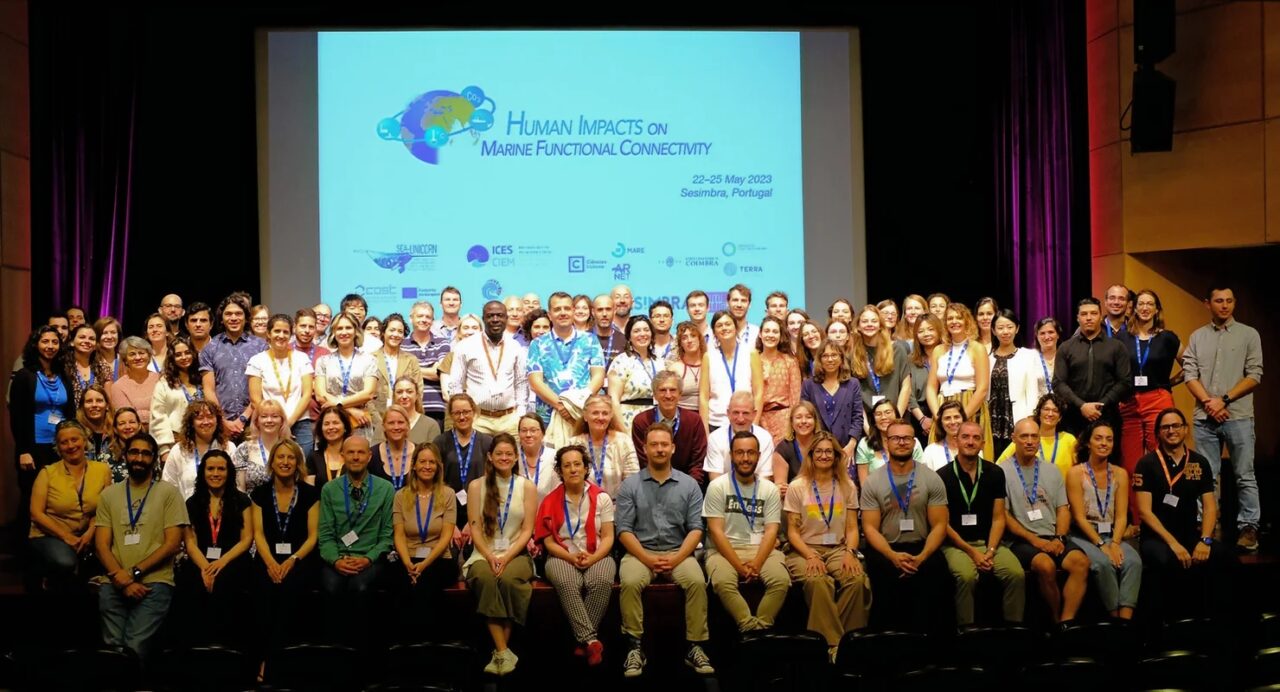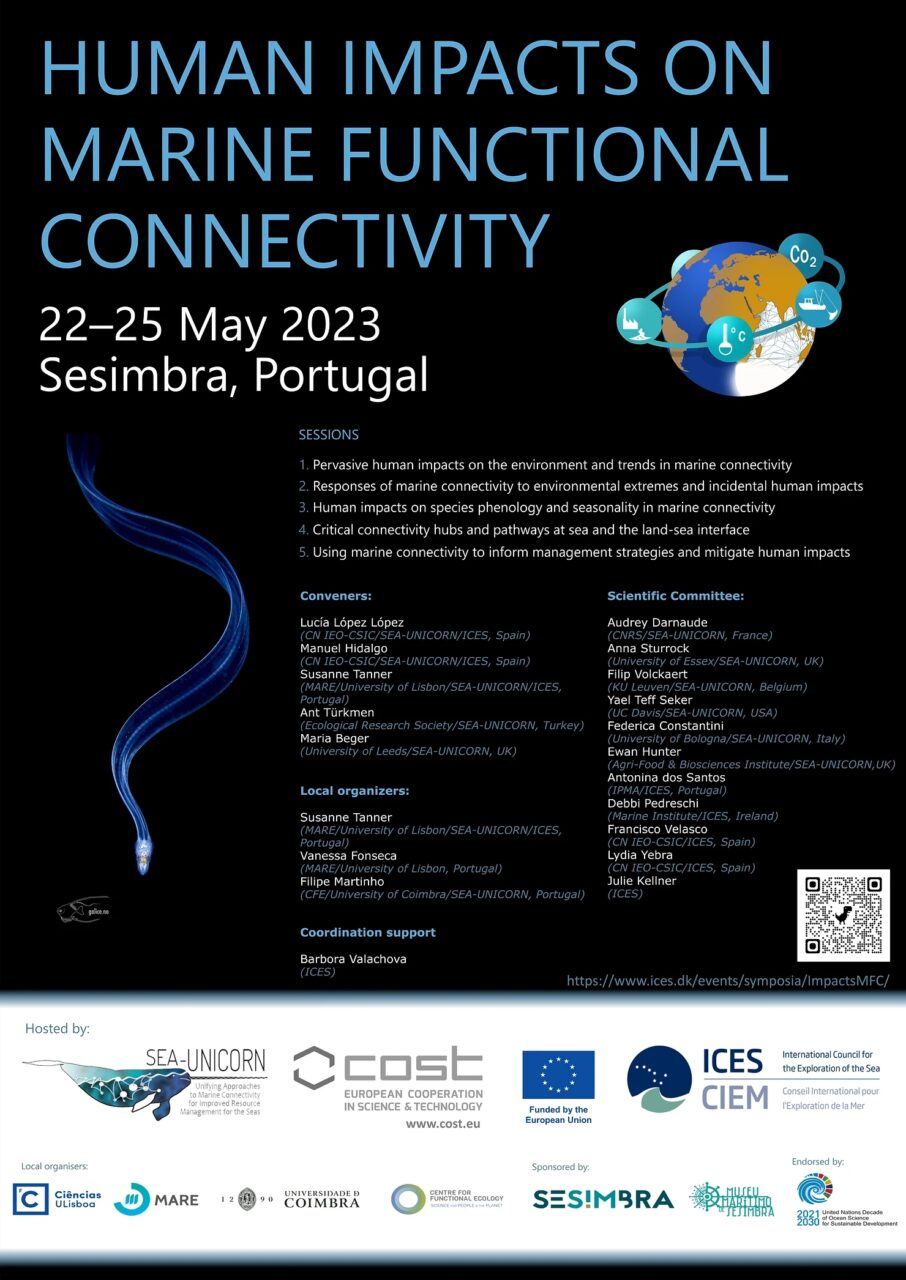
In May 2023, SEA-UNICORN held the international symposium Human Impacts on Marine Functional Connectivity (HI-MFC 2023) in Sesimbra (Portugal).
This dissemination event, co-organized with the International Council for the Exploration of the Sea (ICES) and hosted by the University of Lisbon in Sesimbra (Portugal) brought together 138 participants, from 26 countries (mainly in Europe but also from all other continents), to discuss the latest advances in the study of human impacts on Marine Functional Connectivity (MFC) and possible management options for preserving the MFC needed for a healthy and functioning ocean.

On May 22nd, 23rd and 24th, the participants (60% of whom were early career scientists) shared their expertise and latest findings on the topic, through 62 presentations (including 5 keynotes talks) and 48 posters, organized into five sessions:
- Pervasive human impacts on the environment and trends in marine connectivity
- Responses of marine connectivity to environmental extremes and incidental human impacts
- Human impacts on species phenology and seasonality in marine connectivity
- Critical connectivity hubs and pathways at sea and the land-sea interface
- Using marine connectivity to inform management strategies and mitigate human impacts
This led to fruitful discussions on the past, current and expected changes in MFC and their consequences for conservation (e.g. of seagrass beds in the Mediterranean, salmon stocks in California, sardines in the North Pacific, and the biodiversity of deep-see vents), marine policy (e.g. in the South Adriatic Ionian Straight, the North Sea, and the eastern Mediterranean) and maritime spatial planning (e.g. in the Celtic Sea, the Baltic Sea and the Gulf of Lions).
Human impacts on MFC were highlighted at a wide diversity of scales, with presentations on MFC responses at:
- all ecological levels, from that of meta-populations (e.g. in seagrasses, bivalves, lobsters, fish, sea turtles, marine mammals) to that of entire ecosystems (e.g. coral reefs, mudflats, deep-sea vents, offshore wind farms, Marine Protected Areas).
- all spatial ranges, from local/regional scales (e.g. in the Tagus, the Montego, the Garonne and the Sacramento rivers and their estuaries, within the gulf of Lions, and along the Portuguese continental shelf or the south coast of South Africa) to the trans-oceanic/global one (e.g. within the Arctic or Indian oceans, between the Mediterranean Sea and the Atlantic, or between the Indian and Pacific oceans),
- and all time periods, from short-term (e.g. recent spread of invasive species in the Mediterranean, the Baltic and along the Chilean coast) to historical (e.g. disappearance of European flat oyster beds over the last centuries in Europe) or geological time frames (e.g. decline of mid-water fish in the ancient Eastern Mediterranean).
All main types of anthropogenic pressures were mentioned, including the ubiquitous effects of global warming (e.g. increases in water temperature and extreme weather events), but also other human activities modifying marine habitats and ecosystems (e.g. overfishing, offshore wind farms, shipping, aquaculture).
Several presentations showcased innovative approaches to study or forecast MFC changes, or propose adaptive management strategies (hear more about this here, here, here, here, here and here).
In short, a very comprehensive and highly instructive 3-day program!
To finish on a high note, on the morning of May 25th, 2 brainstorming workshops were organized by the SEA-UNICORN working groups, to share experience and brainstorming on:
- Geohistorical perspectives on functional connectivity patterns (led by K. Agiadi and B. Caswell and organized by WG1 and WG2, in collaboration with the PAGES working goup of Q-MARE).
- Marine connectivity, marine policy and stakeholder engagement (organized by WG3 and WG4, and led by Y. Teff-Seker, A.M. Addamo and P. Mackelworth).
For more information, visit: https://www.ices.dk/events/symposia/ImpactsMFC/Pages/default.aspx
***
This article was originally published here.
